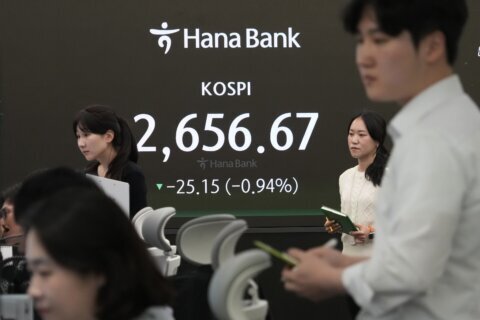TOKYO (AP) — Asian shares were mostly higher Wednesday on hopes that the curbs on U.S. interest rates may moderate after new data showed signs of slowing inflation.
Benchmarks rose in early trading in Japan, South Korea and Australia, while slipping in China. Regional optimism was lifted by the easing of a COVID-19 lockdown in Shanghai. That kind of development is a big plus for the region’s major drive of growth.
“The good news is that China will begin to come out of lockdowns at some point, and there will be an injection of stimulus of some form by the authorities to reboot communities and the economy. The light at the end of the tunnel is reasonably bright for China,” said Clifford Bennett, chief economist at ACY Securities.
But Bennett quickly added: “Do not expect a return to rampant growth however.”
Japan’s benchmark Nikkei 225 jumped 1.4% in morning trading to 26,703.18. Australia’s S&P/AS 200 added 0.2% to 7,465.30. South Korea’s Kospi surged 0.7% to 2,686.14. Hong Kong’s Hang Seng lost 0.2% to 21,276.10, while the Shanghai Composite shed 0.6% to 3,194.69.
In Tokyo trading, shares of Shionogi dropped 15% after the Japanese pharmaceutical company reported that animal tests for its experimental oral drug to treat COVID-19 showed it may risk fetal development. Japanese media reported the drug won’t be prescribed to pregnant people or those who may be pregnant.
Stocks ended slightly lower on Wall Street after investors weighed the inflation data for March, although overall it remained at its highest level in 40 years. Some analysts urged caution.
“”The fact remains that pricing pressures are still elevated at its highest level in 40 years and the near-term outlook for an aggressive tightening of policies to cool demand stays unaltered. Comments from Fed Governor Lael Brainard overnight, who has been a well-known dovish voice in the Fed, continued to reveal a firm stance in getting inflation down,” said Yeap Jun Rong, market strategist at IG in Singapore.
The S&P 500 fell 0.3% after having been up 1.3% earlier in the day. The pullback extends the benchmark index’s losing streak to a third day, reflecting investors’ worries about the potential economic collateral damage as the Federal Reserve tackles high inflation more aggressively.
The Dow Jones Industrial Average and the Nasdaq composite each fell 0.3% after shedding early gains.
The indexes initially rallied following the release of the report, which showed inflation last month was again at its highest level in generations, driven by soaring gasoline prices in particular. Still, the reading was relatively close to economists’ expectations.
Another faint silver lining was that inflation wasn’t as bad as economists expected, when ignoring the costs of food and fuel. Known as “core inflation,” this is the reading that the Federal Reserve pays more attention to when setting policy because it’s less volatile. And core inflation on a month-over-month basis moderated to its slowest level since September.
“Hopefully this is as bad as it gets,” said Brian Jacobsen, senior investment strategist at Allspring Global Investments.
“The risk is that a red hot labor market grows cold under the force of those higher food, fuel, and financing costs. This is a time when economic resilience will be tested.”
The S&P 500 fell 15.08 points to 4,397.45. The Dow fell 87.72 points to 34,220.36, and the Nasdaq lost 40.38 points to 13,371.57.
Smaller company stocks held up better than the broader market. The Russell 2000 rose 6.61 points, or 0.3%, to 1,986.94.
Stocks in recent days have been trading in the opposite direction of Treasury yields, which have climbed to their highest levels since well before the pandemic. Yields jumped as investors brace for the Federal Reserve to hike short-term rates at a faster pace than typical and to aggressively pare its trove of bonds, whose buildup helped keep longer-term rates low.
But Treasury yields pulled back on Tuesday following the inflation report. The 10-year yield slid to 2.72% from 2.77% late Monday. It was as high as 2.83% overnight, before the inflation report’s release. The 10-year yield nevertheless remains well above the 1.51% level where it began the year.
Unease continues to hang over global markets about the war in Ukraine. In energy trading, benchmark U.S. crude added 43 cents to $101.03 a barrel. It climbed 6.7% to settle at $100.60 on Tuesday, keeping the pressure on high inflation. Brent crude, the international standard, rose 45 cents to $105.09.
Higher interest rates from the U.S. Federal Reserve would slow the economy, which would hopefully knock down high inflation. Consumer prices were 8.5% higher in March than a year earlier, accelerating from February’s 7.9% inflation rate and the highest since 1981.
To bring it down, the Fed revealed in the minutes from its latest meeting that it’s prepared to hike short-term rates by half a percentage point, double the usual amount, at some upcoming meetings, something it hasn’t done since 2000.
The worry is the Federal Reserve may be so aggressive about hiking interest rates that it forces the economy into a recession.
Higher interest rates also put downward pressure on all kinds of investments, with those seen as the most expensive hardest hit. That’s put the spotlight on technology and other high-growth stocks that have been some of the stock market’s biggest recent winners.
On Tuesday, technology and financial stocks were among the biggest drags on S&P 500. Microsoft fell 1.1% and Wells Fargo slid 1.8%.
More swings may be in store for stocks as companies prepare to report their earnings for the first three months of the year. Delta Air Lines, JPMorgan Chase and other big-name companies will kick off the reporting season on Wednesday.
In currency trading, the U.S. dollar edged up to 125.58 Japanese yen from 125.39 yen, The euro cost $1.0830, little changed from $1.0832.
___
AP Business Writers Stan Choe, Damian J. Troise and Alex Veiga contributed.
Copyright © 2024 The Associated Press. All rights reserved. This material may not be published, broadcast, written or redistributed.






